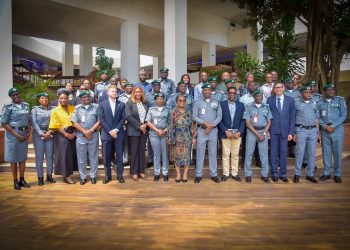…poised to establish a technical committee to harmonise and streamline non-oil export operational framework
By Nkechi Eze
The Federal Government has reiterated its commitment to creating a more efficient and investor-friendly business environment for Nigeria’s non-oil export sector by harmonising policies and streamlining operational guidelines among relevant government agencies.
This assurance was given by the Secretary to the Government of the Federation (SGF), Senator George Akume, CON, during a courtesy visit by a delegation involved in the Stakeholders Engagement on the Findings of Assessment Visits of the Non-oil Pre-Shipment Inspection Agents (PIAs) and Monitoring and Evaluation Agents (MEAs). The delegation, led by the Coordinator of MEAs for Act Global Depository, Caroline Onwubuya, had conducted assessment tours across the South-West, South-South, and North-West geo-political zones.
According to a statement signed by the Director of Information & Public Relations OSGF, Segun Imohiosen, the SGF disclosed that the Federal Government had embarked on the assessment exercise to identify policy gaps in non-oil exports and recommend actionable solutions to enhance service delivery and improve the sector’s overall performance.
“The exercise aimed to assess the performance of the MEAs and PIAs in collaboration with exporters to pinpoint policy gaps in non-oil exports,” Akume said. “It also sought to evaluate the effectiveness of promoting non-oil exports as a strategy for economic growth, review the achievements recorded by MEAs and PIAs since 2022, and identify challenges hindering the export of non-oil products.”
Highlighting findings from the assessment, the SGF listed several operational bottlenecks, including the failure to transmit Clean Certificates of Inspection (CCI) to points of exit, lack of consistent train wagon services between the northern and southern regions, exorbitant terminal operator tariffs, and irregular release of the Export Expansion Grant (EEG). He announced that a technical committee would be established to address these issues by streamlining operational guidelines for improved efficiency and service delivery.
In her remarks, MEAs Coordinator Caroline Onwubuya explained that the role of Monitoring and Evaluation Agents is to oversee the activities of Pre-Shipment Inspection Agents to ensure compliance with extant export regulations under the Nigerian Export Supervisory Scheme (NESS), particularly with regard to the quantity, quality, and pricing of non-oil exports.
Also speaking at the event, the Coordinator of Pre-Shipment Inspection Agents and Operations Manager at Anglia International Services Ltd, Hyacinth Louis Chukwu, identified other pressing challenges such as delays in accessing Nigeria Export Proceeds (NXP) from commercial banks, duplication of responsibilities among government agencies issuing export documentation, poor road networks for transporting export goods, and substandard port infrastructure. He recommended the establishment of a single-window platform where exporters can submit all required documents for coordinated processing by the relevant agencies.
In his contribution, Akeredolu Toyin Johnson, Assistant Director of Commodity Development and Desk Officer at the Federal Ministry of Industry, Trade and Investment, praised the SGF’s office and key stakeholders for their dedication to ensuring Nigeria’s non-oil exports are globally competitive and compliant. He expressed confidence that the findings and recommendations from the assessment visits would play a critical role in repositioning the sector for sustainable growth.
















